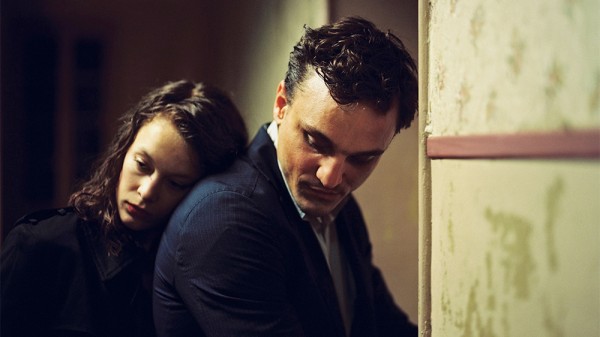-
TRANSIT (CHristian Petzold 2018)
CHRISTIAN PETZOLD: TRANSIT (2018)

PAULA BEER AND FRANZ ROGOWSKI IN TRANSIT
Loneliness, fear, loss, alienation, suicide, fluid identity in a war story out of time
When a man flees France after the Nazi invasion, he assumes the identity of a dead author whose papers he possesses. Stuck in Marseilles, he meets a young woman desperate to find her missing husband - the very man he eventually turns out to be impersonating. Christian Petzold casts Franz Rogowski and Paula Beer in his adaptation of Anna Seghers' novel Transit Visa, set in the 1942 Marseilles zone libre (free zone). What he does with the source is strange and intriguing, and creates a memorably haunting mood if you give yourself to its peculiar mysteries. My faithfulness to Petzold remains, even when he's working without his muse, Nina Hoss (he finds a good equivalent in Paula Beer). This is a distinctive, difficult, but potentially very rewarding film.
"There are those who treat melodrama as a dirty word" wrote Guy Lodge in Variety, "but no working filmmaker gives it a cleaner, crisper reputation than German auteur Christian Petzold, whose extraordinary anti-historical experiment Transit nonetheless registers as his most conceptually daring film to date." "Anti-historical experiment" because Petzold tells Seghers' Forties story with a contemporary background (but without ultra-current details like smart phones).
Petzold has drained the specifics of the World War II and Holocaust-related content from the material of the source novel, which is of its period and none other. The replacement semi-contemporary recreation allows connections between refugee horrors of World War II and the new ones of today, which for the first time are just as bad, with a new global pointlessness and complexity. I refer the reader to a Wikipedia plot summary (which is rather general) for the outlines.
Georg (Rogowski), "Germany’s Joaquin Phoenix," has the remnants of a split lip, a slight lisp, a taut intensity. We don't know quite what he's fleeing, while Seghers' protagonist was a concentration camp escapee. . But the WWII fugitives in Marseille, whose time was running out, as here, he seeks permission to sail to another country that will be haven. For a while he bonds with a little boy, an aspiring soccer star whose penchant he encourages. This activity best fits with the incongruously cheery, sunny Marseille exteriors. The boy has only a mute mother with whom he communicates in sign language and wants Georg to stay around; feels betrayed when Georg says he must leave. Georg later returns to their flat and they are gone; it's packed with exotic refugees.
This is a diversion, anyway. The main storyline focuses on the American consulate and the people Georg encounters there, including a woman with a pair of fancy dogs she'll be rewarded with safe harbor for bringing to South America. (That ends badly.) And there is Georg's uneasily intimate connection with the fate of a writer he's supposed to help out, Weidel. He's shown a bloody bathroom, and learns Weidel is dead by his own hand. Papers that fall into his hands, meant to go to Weidel's wife Marie (Paula Beer), eventually enable Georg to take on Weidel's identity and permission to travel. But as he comes to be in touch with Marie, he's also enmeshed with a doctor named Richard (Godehard Giese). . .
Everyone's fate and plans are in flux, and as Georg falls in love with Marie, he becomes more eager to sacrifice his own future to satisfy her dreams, deluded though they may be. Petzold takes us into a world of extraordinary pressures and fluid identities.
The fact that the film is ahistorical will alienate viewers, but also enables Petzold to create something both hauntingly Kafkaesque ("a remake of 'Casablanca' as written by Franz Kafka" David Ehrlich of Indiewire called it) - as well as a film close to the melancholy, ruminative WWII material of French 2014 Literature Nobel Patrick Modiano. It takes a while to figure out what's going on in Transit - and one of the story's characteristics is that the people don't know what their plans are, either. This is a film some will hate, and others love. If it's the latter outcome for you, this style-drenched, plot-neutral film may reward repeated viewings.
Transit, 104 mins., debuted at Berlin Feb. 2018, showing in about a dozen other international festivals, including New York, where it was screened for this review as part of the Main Slate 14 Oct. Metascore 72.
Last edited by Chris Knipp; 04-03-2019 at 05:27 AM.
 Posting Permissions
Posting Permissions
- You may not post new threads
- You may not post replies
- You may not post attachments
- You may not edit your posts
-
Forum Rules





 Reply With Quote
Reply With Quote
Bookmarks